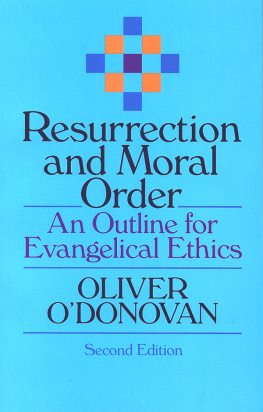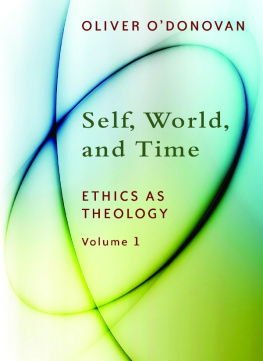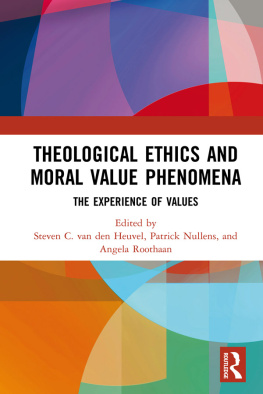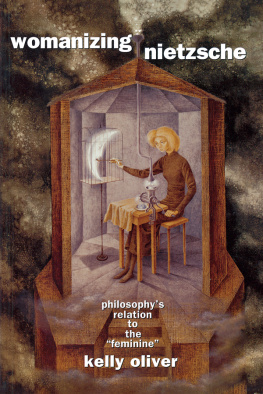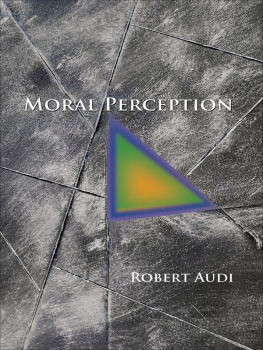Contents
Guide
Resurrection and moral order
Resurrection
and moral order
An outline for evangelical ethics
Oliver ODonovan, M.A., D.Phil.
Regius Professor of Moral and Pastoral Theology in the University of Oxford and Canon of Christ Church
Second Edition
APOLLOS
Leicester, England
William B. Eerdmans Publishing Company
Grand Rapids, Michigan
APOLLOS (an imprint of Inter-Varsity Press)
38 De Montfort Street, Leicester LE1 7GP, England
Wm. B. Eerdmans Publishing Company
255 Jefferson S.E., Grand Rapids, MI 49503
Oliver ODonovan 1986, 1994
All rights reserved. No part of this publication may be reproduced, stored in a retrieval system, or transmitted, in any form or by any means, electronic, mechanical, photocopying, recording or otherwise, without the prior permission of Inter-Varsity Press.
Unless otherwise stated, quotations from the Bible are taken from the Revised Standard Version, copyrighted 1946, 1952, 1971, 1973 by the Division of Christian Education, National Council of the Churches of Christ in the USA, and used by permission. An asterisk after a biblical reference indicates the authors own translation.
First published 1986
Second edition 1994
Reprinted 1996
British Library Cataloguing in Publication Data
A catalogue record for this book is available from the British Library.
UK ISBN 0851114334
Eerdmans ISBN (USA) 0-8028-0692-9
Set in Linotron Sabon
Phototypeset in Great Britain by Intype, London
Contents
Preface
It will be apparent from the first sentences of this book in what sense its approach to ethics is evangelical. No doubt there will be those who do not penetrate so far. But there may also be those who do, but who still find themselves puzzled at the way in which the author has conceived his task; and to them these few words of explanation are addressed.
Some years ago I was attempting to teach a course in that area that is variously designated as general Christian ethics, fundamental Christian ethics, Christian metaethics or foundations of Christian ethics my own preference is for the name Christian moral concepts when there came upon me, partly through the blank faces of my students and partly through self-generated doubts, a deep frustration with the current options for approaching it.
I was, I suppose, discovering without knowing it the force of what has come to be called in some circles anti-foundationalism. I had grown up on an approach which treated this area simply as a form of apologetics. There seem to be, we used to say, this, that and the other difficulties with the idea of a Christian ethics; but the difficulties turn out on examination to be less conclusive than they first appeared; Christian ethics may, therefore, proceed on its way unimpeached.
With such an apologetic strategy, undertaken and sustained on its own terms, I have no quarrel; and towards its most skilful practitioners I feel nothing but gratitude. My unease arose from the substitution of this exercise for a study of Christian moral concepts. I found my students in Toronto justifiably disconcerted to see their professor parrying unheard-of attacks upon supposedly well-understood positions which no-one had expounded to them. And as I reflected, I came to realize that Christian moral concepts never were expounded in the tradition that I knew; for the apologetic strategy had, on the whole, found it convenient to work on the assumption of a simple divine-command theory, which had been the object of sceptical attack.
There was a further point that dawned on me then, though I should have understood it earlier. My teacher Paul Ramsey once wrote: Christian theological ethics is metaethics, and the Christian community in all ages is a standing metaethical community of discourse. It required only a little reflection to turn this proposition around, and to conclude that the exploration of Christian moral concepts must always, in the first place, be the work of theology. This book grows out of my belated recognition of the fact. It is an assertion of the moral theology which ought to be present in any Christian ethic.
This background may serve as a commentary upon the manner, plan and procedure of what follows. So far as the manner is concerned, the style is didactic rather than dialectical. The plan is dictated by the desire to provide an outline of theological ethics, the shape determined by systematic rather than apologetic factors. In order to assist the readers sense of the shape of the exposition, I have followed certain well-known exemplars in putting discursive material in smaller type. As for procedure: I have entered into discussion with greater thinkers than myself, contemporary and of the past, only in order to mark the critical points of convergence and divergence which define the shape of Christian moral thought as I see it.
Nobody will imagine that I have done these thinkers justice on their own terms, and I hope nobody will imagine that I think I have. (Among my contemporaries, for example, I would wish to have given a fuller account of the contributions made by the more recent work of Stanley Hauerwas and John Finnis.) I have tried to be fairly thorough in tracing Christian moral concepts back to their roots in biblical exegesis. The discerning reader will be able to judge how much I have been grateful to learn, and how much unwilling to learn, from contemporary traditions of biblical study; and I have not felt it necessary or desirable to explain my every move in such a way as to cover my flank against the possibility of challenge from that quarter.
The debts I ought to acknowledge are too many and too varied. However, it is a matter of hard fact that the book would appear without bibliography or index were it not for the generous labours of two kind friends, the Rev. Tom Breidenthal and Mr Stephen Spencer. And it would not have appeared at all apart from the patient encouragement over several years of the editorial staff at IVP, who have been everything that a theological publisher should be and more.
OLIVER ODONOVAN
Prologue to the second edition
To re-read ones own book is a curious experience of divine judgment and divine grace. Judgment, because its faults are so obviously ones own; grace, because its merits strike one unexpectedly, as though the author had been someone else. For me the experience has been made more gracious by reading Jean-Yves Lacostes limpid French translation (Rsurrection et Exprience Morale, Paris: Presses Universitaires de France, 1992), to which I confidently refer those who find my native English too involved. The task of adding a prologue to the second edition has caused me some hesitation. To rewrite or defend what one has written looks like quibbling with the divine verdict. Can one improve upon the gift of God or argue down his criticism? There is something to be said, it would seem, for saying nothing. Yet there is one thing which may help the reader now approaching Resurrection and Moral Order for the first time; and that is to locate the positions taken in the book in relation to some current alternatives. It was a reasonable complaint that I did too little of this in the first place, preferring to set the argument against the wider backdrop of the Western philosophical and theological tradition and scriptural exegesis. I do not apologize for that priority, which was intended to say something rather pointed to contemporary practitioners. But if I can make good the lack, I shall be glad, especially since a decade of considerable activity in Christian ethics has now passed since the discussions in these pages reached their final shape.

